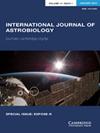Astroecology: bridging the gap between ecology and astrobiology
IF 1
4区 物理与天体物理
Q3 ASTRONOMY & ASTROPHYSICS
引用次数: 0
Abstract
Abstract Although astrobiology studies how life functions and evolves, ecology is still largely overlooked in astrobiology research. Here we present an argument for astroecology, a merger of ecology and astrobiology, a self-aware scientific endeavour. Ecology is rarely mentioned in influential documents like the NASA Astrobiology Strategy (2015), and terms such as ‘niche’ can end up being used in a less precise fashion. As ecology deals with sequential levels of organization, we suggest astrobiologically-relevant problems for each of these levels. Organismal ecology provides ecological niche modelling, which can aid in evaluating the probability that Earth-like life would survive in extraterrestrial environments. Population ecology provides a gamut of models on the consequences of dispersal, and if lithopanspermia can be validated as a form of space dispersal for life, then metabiospheres and similar astrobiological models could be developed to understand such complex structure and dynamics. From community ecology, the discussion of habitability should include the concept of true vacant habitats (a misnomer, perhaps better called ‘will-dwells’) and contributions from the blossoming field of microbial ecology. Understanding ecosystems by focusing on abiotic properties is also key to extrapolating from analogue environments on Earth to extraterrestrial ones. Energy sources and their distribution are relevant for ecological gradients, such as the biodiversity latitudinal gradient – would tropics be species-rich in other inhabited planets? Finally, biosphere ecology deals with integration and feedback between living and non-living systems, which can generate stabilized near-optimal planetary conditions (Gaia); but would this work for other inhabited planets? Are there ‘strong’ (like Earth) and ‘weak’ (perhaps like Mars) biospheres? We hope to show ecology can contribute relevant ideas to the interdisciplinary field of astrobiology, helping conceptualize further levels of integration. We encourage new partnerships and for astrobiologists to take ecology into account when studying the origin, evolution and distribution of life in the universe.天体生态学:缩小生态学与天体生物学之间的差距
摘要 虽然天体生物学研究生命如何运作和进化,但生态学在天体生物学研究中仍在很大程度上被忽视。在此,我们提出了天体生态学的论点,即生态学与天体生物学的合并,这是一项具有自我意识的科学工作。生态学在《美国国家航空航天局天体生物学战略》(2015 年)等有影响力的文件中很少被提及,而 "生态位 "等术语最终也可能被以不太精确的方式使用。由于生态学涉及组织的连续层次,我们为每个层次提出了与天体生物学相关的问题。生物生态学提供生态位模型,有助于评估类地生命在地外环境中生存的可能性。种群生态学提供了关于散布后果的各种模型,如果石散现象被证实是生命在空间散布的一种形式,那么就可以开发代谢圈和类似的天体生物学模型,以了解这种复杂的结构和动态。从群落生态学的角度来看,关于可居住性的讨论应包括真正的空置栖息地概念(这是一个错误的名称,或许称作 "遗嘱井 "更好),以及来自蓬勃发展的微生物生态学领域的贡献。通过关注非生物特性来了解生态系统也是将地球上的类似环境推断为地外环境的关键。能量来源及其分布与生态梯度有关,例如生物多样性纬度梯度--在其他有人居住的星球上,热带是否物种丰富?最后,生物圈生态学涉及生物系统和非生物系统之间的整合与反馈,这可以产生稳定的近乎最佳的行星条件(盖亚);但这对其他有人居住的行星有效吗?是否存在 "强"(如地球)和 "弱"(也许如火星)生物圈?我们希望表明,生态学可以为天体生物学这一跨学科领域贡献相关观点,帮助构思更深层次的整合。我们鼓励建立新的伙伴关系,鼓励天体生物学家在研究宇宙中生命的起源、进化和分布时考虑生态学。
本文章由计算机程序翻译,如有差异,请以英文原文为准。
求助全文
约1分钟内获得全文
求助全文
来源期刊

International Journal of Astrobiology
地学天文-地球科学综合
CiteScore
3.70
自引率
11.80%
发文量
45
审稿时长
>12 weeks
期刊介绍:
International Journal of Astrobiology is the peer-reviewed forum for practitioners in this exciting interdisciplinary field. Coverage includes cosmic prebiotic chemistry, planetary evolution, the search for planetary systems and habitable zones, extremophile biology and experimental simulation of extraterrestrial environments, Mars as an abode of life, life detection in our solar system and beyond, the search for extraterrestrial intelligence, the history of the science of astrobiology, as well as societal and educational aspects of astrobiology. Occasionally an issue of the journal is devoted to the keynote plenary research papers from an international meeting. A notable feature of the journal is the global distribution of its authors.
 求助内容:
求助内容: 应助结果提醒方式:
应助结果提醒方式:


